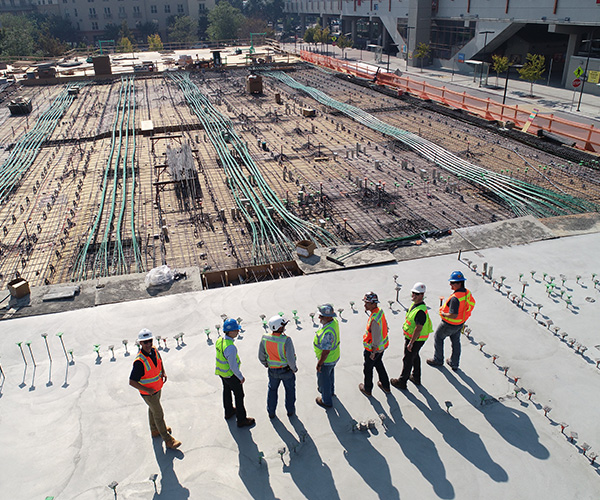Constructing the Future: The Emergence of Remote Construction Jobs in a Digital Era
WEBUILD STAFFING BLOG |
Constructing the Future: The Emergence of Remote Construction Jobs in a Digital Era

In the digital age, technology has transformed the way we work, communicate, and collaborate. The construction industry, traditionally reliant on physical presence and on-site work, is no exception to this trend. With the rise of remote work capabilities and digital tools, remote construction jobs are becoming increasingly prevalent. Today we’ll explore the evolution of remote construction jobs, the benefits and challenges they entail, and the skills and technologies needed to thrive in this digital era.
The Evolution of Remote Construction Jobs:
Traditionally, construction jobs have been performed on-site, with workers physically present at job sites to carry out tasks such as building, assembling, and installing structures and infrastructure. However, advances in technology and changes in work practices have enabled the emergence of remote construction jobs, where workers can perform construction-related tasks from locations outside of traditional job sites. Remote construction jobs encompass a wide range of roles and responsibilities, including project management, design, engineering, planning, and coordination, all of which can be performed remotely using digital tools and communication technologies.
Benefits of Remote Construction Jobs:
Remote construction jobs offer numerous benefits for both construction professionals and employers. Some of the key benefits of remote construction jobs include:
-
Flexibility: Remote construction jobs offer greater flexibility in terms of work location and schedule, allowing construction professionals to work from anywhere with an internet connection and adapt their work hours to accommodate personal and professional commitments.
-
Work-Life Balance: Remote construction jobs enable construction professionals to achieve a better work-life balance by eliminating the need for long commutes and providing more control over their daily schedules, leading to reduced stress and improved well-being.
-
Cost Savings: Remote construction jobs can lead to cost savings for both construction professionals and employers by reducing expenses associated with commuting, office space, and travel, as well as enabling access to a wider talent pool without geographic constraints.
-
Increased Productivity: Remote construction jobs can lead to increased productivity by minimizing distractions and interruptions commonly encountered in traditional office environments and enabling construction professionals to focus on their work without the need for constant supervision.
Challenges of Remote Construction Jobs:
While remote construction jobs offer numerous benefits, they also present several challenges that construction professionals and employers must navigate. Some of the key challenges of remote construction jobs include:
-
Communication and Collaboration: Effective communication and collaboration are essential for remote construction jobs, but they can be challenging to achieve when team members are dispersed across different locations and time zones, requiring the use of digital tools and communication technologies to facilitate interaction and coordination.
-
Technical Infrastructure: Remote construction jobs rely on access to reliable internet connectivity, digital tools, and software platforms, which may not be available in all locations or accessible to all construction professionals, requiring investment in infrastructure and technology to support remote work capabilities.
-
Security and Data Protection: Remote construction jobs involve the use of digital tools and platforms to exchange sensitive project information and data, raising concerns about cybersecurity risks, data breaches, and unauthorized access, requiring implementation of robust security measures and protocols to protect confidential information.
-
Work Culture and Engagement: Remote construction jobs can lead to feelings of isolation and disengagement among construction professionals who are accustomed to working in traditional office environments, requiring efforts to foster a sense of belonging, camaraderie, and team spirit through virtual meetings, team-building activities, and social events.
Skills and Technologies for Remote Construction Jobs:
To succeed in remote construction jobs, construction professionals need a combination of technical skills, digital literacy, and communication abilities. Some of the key skills and technologies needed for remote construction jobs include:
-
Digital Tools and Software: Construction professionals must be proficient in using digital tools and software platforms for project management, design, collaboration, and communication, such as Building Information Modeling (BIM) software, project management software, virtual reality (VR) simulations, and video conferencing platforms.
-
Communication Skills: Effective communication is essential for remote construction jobs, requiring construction professionals to communicate clearly and concisely through written and verbal channels, as well as to listen actively and empathetically to colleagues and stakeholders.
-
Time Management and Organization: Remote construction jobs require strong time management and organizational skills to prioritize tasks, meet deadlines, and manage competing priorities effectively, as well as to adapt to changes and unexpected challenges in a dynamic work environment.
-
Adaptability and Resilience: Remote construction jobs require adaptability and resilience to navigate uncertainty, ambiguity, and change, as well as to overcome obstacles and setbacks with perseverance and determination.
The rise of remote construction jobs represents a transformative shift in the construction industry, offering greater flexibility, efficiency, and innovation in how construction projects are planned, executed, and managed. While remote construction jobs present challenges, such as communication and collaboration barriers, technical infrastructure limitations, and security concerns, they also offer numerous benefits, including flexibility, work-life balance, cost savings, and increased productivity. By acquiring the necessary skills and technologies, embracing remote work practices, and fostering a culture of communication, collaboration, and engagement, construction professionals and employers can harness the potential of remote construction jobs to drive success and competitiveness in the digital era.
Webuild Staffing Agency is a leading executive search and staffing agency dedicated to the construction, engineering and environmental industries. To learn more please visit: www.webuildstaffing.com










